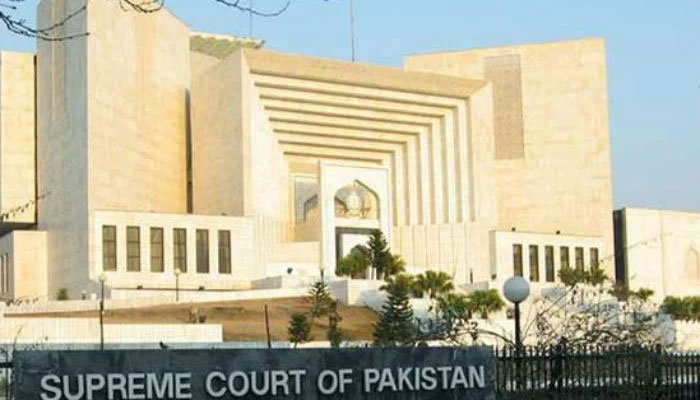Speaker can’t reject no-trust motion even if he refers to Article 5: CJP
Constitutional crisis hit country on Sunday after NA deputy speaker rejected no-confidence resolution, filed by joint opposition against PM Imran Khan
ISLAMABAD: Supreme Court of Pakistan Chief Justice Umar Ata Bandial on Monday observed that the National Assembly speaker cannot reject the no-confidence motion against the prime minister even if he refers to Article 5 of the Constitution.
The CJP made the remarks while hearing the suo moto case related to the prevailing crisis in the country that emerged after the ruling of the NA deputy speaker and the subsequent dissolution of the lower house on the advice of Prime Minister Imran Khan.
A five-member larger bench headed by Chief Justice Umar Ata Bandial is hearing the case alongside the presidential reference seeking interpretation of Article 63(A) of the Constitution.
Justice Ijazul Ahsan, Justice Mohammad Ali Mazhar, Justice Munib Akhtar and Justice Jamal Khan Mandokhail are also part of the larger bench.
The constitutional crisis hit the country on Sunday after the NA deputy speaker rejected the no-confidence resolution, filed by the joint opposition against PM Imran Khan, after declaring it unconstitutional for being "foreign-funded".
At the outset of today’s hearing, PPP’s counsel Farooq Hamid Naek apprised the apex court that as per the Assembly Rules 28, only the speaker can issue a ruling.
At this, Justice Munib Akhtar asked: “Under which role the deputy speaker issued the ruling? Did the law minister, under Article 5, ask the deputy speaker to issue a ruling?”
“The law minister did not seek any ruling,” replied Farooq Hamid Naek. The point raised by the law minister was not discussed in the assembly, he added.
“Prima facie, the deputy speaker used that power of the speaker which he was not authorised,” remarked Justice Munib.
Justice Munib Akhtar observed that as per the rules, the speaker can issue a ruling in the House or on the file in his office. Under NA Rule 28, no other person can issue the ruling by using the speaker’s powers, he said, adding that the speaker can withdraw his ruling.
During the proceedings, the CJP asked did the deputy speaker violate the procedure of the House?
Farooq Naek declared the ruling was indeed a violation of the Constitution.
CJP Bandial asked: “Does the speaker not have any option to reject the no-trust motion? Are you saying that the speaker dishonestly rejected the no-confidence motion?”
The CJP observed: “The speaker cannot reject the no-confidence motion even if he refers to Article 5 of the constitution.”
He stated that they will have to decide the case ahead of the formation of the interim government in the country.
Earlier, CJP Bandial said, “We want to listen to the complainants first. He stated that if anybody wants to give a statement, he can submit it.
Meanwhile, PTI’s counsel Babar Awan approached the rostrum and apprised the bench that the attorney general had assured the court that no lawmaker will be barred from entering the assembly.
“PM Imran Khan has allowed me to apprise the court that we are ready to hold elections in the country,” he said.
At this, the CJP stopped him from issuing political statements.
Meanwhile, PPP’s counsel Farooq Hamid Naek pleaded the top court to form a full court to hear the case.
Referring to the burden of pending cases, the CJP said that one full court bench causes a backlog of one million cases and asked the reason to do so.
“If you do not have trust in anyone then tell us, we will leave.”
Continuing his arguments, Naek said, “Article 95 does not talk about any charge or accusation against the prime minister.”
“Reason” is not necessary for tabling a no-confidence motion, he said, adding that the same procedure is applicable for dislodging the speaker.
Referring to Article 54(3) of the Constitution, he said that the NA speaker is bound to convene the assembly session within 14 days after submission of the requisition notice.
He maintained that the no-confidence motion against PM Imran Khan had been submitted on March 8 but the assembly session was convened on March 25 instead of March 21 and later it was postponed till March 28 after offering Fateha for a deceased MNA. He added that the speaker did not give any reason for the delay in convening the session.
Later, the hearing was adjourned till 12pm tomorrow (Tuesday).
SC restrains institutions from taking extra-constitutional steps
A day earlier, taking prompt notice of the situation, CJP Bandial had said "Any orders and actions that Prime Minister Imran Khan and President Arif Alvi regarding the dissolution of the National Assembly shall be subject to the order of this court."
Later, the SC had restrained state institutions from taking any extra-constitutional steps and directed them to act strictly in accordance with the Constitution, besides asking all political forces of the country to remain peaceful.
During the previous hearing, the CJP issued notices to Attorney General of Pakistan Khalid Javed Khan and the Ministry of Defence secretary while directing the latter and the interior secretary to submit a report regarding the law and order situation before it today.
The apex court had also directed all the political parties involved in the process of the no-confidence motion in the National Assembly and other political forces to become respondents in the case, while directing them to observe the law and maintain peace and public order.
Similarly, the court had also issued notice to Supreme Court Bar Association and the Pakistan Bar Council to assist the Court in these suo moto proceedings and the Constitution Petitions filed under Article 184(3).
CJP Bandial had said that the law and order situation should be maintained.
“This is an important matter and a hearing will be held tomorrow,” he had said Sunday, barring all political parties and government departments to take advantage of the ongoing situation.
CJP Bandial had proposed to make President Alvi a party in this case and said that a hearing will be held on Monday in this regard after the hearing of the 63A presidential reference.
Earlier, the PTI government sprang a surprise on Sunday by disallowing voting upon the no-confidence resolution of the combined opposition through a ruling.
Deputy Speaker Qasim Suri, in his ruling, had rejected the no-confidence resolution, terming it in violation of the Constitution, and immediately prorogued the requisitioned session of the lower house of the Parliament.
Within an hour of the prorogation of the assembly, the president had dissolved the NA on the advice of Prime Minister Imran Khan in terms of Article 58 (1) of the Constitution.
The NA chair had given a ruling in response to a request of Law Minister Fawad Chaudhry to reject the no-confidence resolution, without hearing the viewpoint of any of the opposition members sitting in the House.
The deputy speaker, in response to the request from the newly appointed law minister Fawad Chaudhry, had said in his ruling that no foreign country had the right to intervene to topple an elected government of a country. He had ruled that he rejected and disallowed the no-confidence resolution, terming it against the Constitution and Rules.
-
Security forces gun down 30 terrorists in multiple IBOs in KP: ISPR
-
MQM-P calls for new province in Sindh
-
US report validates Pakistan military edge over India: PM
-
Banned TTP poses serious threat to Pakistan security: UNSC panel
-
CM Afridi clarifies remarks on by-poll after ECP requests army deployment
-
Dubai sees 3.2m Pakistani passengers in 2025 as airport sets new milestone
-
Security forces kill 23 Indian proxy terrorists in KP's Kurram
-
Pakistan to construct island to boost oil exploration: report














